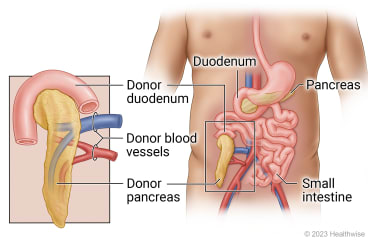What is a pancreas transplant?

A pancreas transplant is surgery to give you a healthy pancreas. In some cases, this surgery may be combined with a kidney transplant if you also have kidney failure from diabetes. The new organs come from a person (donor) who is deceased.
A transplant is done if your pancreas doesn't work as it should. This is usually because of type 1 diabetes. But it may also be due to chronic pancreatitis or an injury to the pancreas. The new pancreas will do the work that your own pancreas can't do. It will make insulin to manage your blood sugar, so you may not have to inject insulin anymore. Even if you still need to inject insulin, managing your blood sugar may be much easier. It will also make enzymes, or proteins, that help your body digest food.
To do the surgery, the doctor makes a cut (incision) in the middle of your belly. The donated pancreas is placed in the front part of the belly and connected to the blood vessels of the lower belly. It is connected to your small intestine or your bladder so the digestive juices from the pancreas can drain. A small section of the donor's small intestine (the duodenum) is also transplanted for that purpose. Your own pancreas may still help with digestion, so it will be left in your body unless it's causing problems.
Then the doctor closes the incision with stitches or staples. The incision will leave a scar that will fade with time.
You may spend the first couple of days in the intensive care unit (ICU). After that, you may spend 1 to 2 weeks in the hospital. It may take several months for your energy to return.
How do you prepare for surgery?
Surgery can be stressful. This information will help you understand what you can expect. And it will help you safely prepare for surgery.
Preparing for surgery
- Understand exactly what surgery is planned, along with the risks, benefits, and other options.
- Tell your doctor ALL the medicines, vitamins, supplements, and herbal remedies you take. Some may increase the risk of problems during your surgery. Your doctor will tell you if you should stop taking any of them before the surgery and how soon to do it.
- If you take aspirin or some other blood thinner, ask your doctor if you should stop taking it before your surgery. Make sure that you understand exactly what your doctor wants you to do. These medicines increase the risk of bleeding.
- Make sure your doctor and the hospital have a copy of your advance directive. If you don’t have one, you may want to prepare one. It lets others know your health care wishes. It’s a good thing to have before any type of surgery or procedure.
- Be sure you have someone to take you home. Anesthesia and pain medicine will make it unsafe for you to drive or get home on your own.
What happens on the day of surgery?
- Follow the instructions exactly about when to stop eating and drinking. If your doctor told you to take your medicines on the day of surgery, take them with only a sip of water.
- Take a bath or shower before you come in for your surgery. Do not apply lotions, perfumes, deodorants, or nail polish.
- Do not shave the surgical site yourself.
- Take off all jewelry and piercings. And take out contact lenses, if you wear them.
At the hospital or surgery center
- Bring a picture ID.
- You may get an epidural catheter. This is a tiny tube that delivers pain medicine directly into the area in your back around your spinal cord. It will prevent pain after surgery.
- You will be kept comfortable and safe by your anesthesia provider. You will be asleep during the surgery.
- The surgery will take about 3 to 6 hours. If you're also getting a new kidney, the surgery may take longer.
- You may have a tube coming out of your belly to drain fluids for a few days.
- You may have a thin, plastic tube in your nose that goes down the back of your throat into your stomach to drain stomach juices. It is usually removed within a few days after surgery.
When should you call your doctor?
- You have questions or concerns.
- You are ill (such as with fever, flu, or a cold) when you get the call for surgery.
Where can you learn more?
Go to http://www.healthwise.net/patientEd
Enter B878 in the search box to learn more about "Pancreas Transplant: Before Your Surgery".
Current as of: January 7, 2025
Author: Ignite Healthwise, LLC Staff
Clinical Review Board
All Ignite Healthwise, LLC education is reviewed by a team that includes physicians, nurses, advanced practitioners, registered dieticians, and other healthcare professionals.

